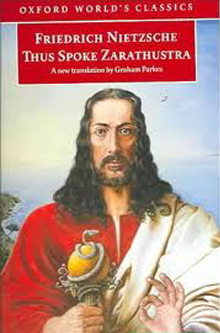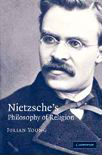- Home
- Recommended Readings
- Book Review
Book Review
-
Thus Spoke Zarathustra By Friedrich Nietzsche. A new translation by Graham Parkes
Reviewed by Horst Hutter
You may download the entire book review as Adobe PDF format clicking PDF icon on the left. If you need some clarifications about copyright or usage rights, please contact us at nceditors@ietzschecircle.com.
 It may be true that “traduire, c’est trahir”, as the attempt to translate this very phrase into English demonstrates. Yet there would seem to be degrees of “betrayal”,
ranging from the faithful recreation of an authorís intention and rhetoric in a different language to an appropriation of it for purposes that are completely at odds with the original. So many of modern interpretations and
translations of classical texts thus appear to be mere pretexts and ploys by their authors to invoke the fame of great writers long dead for enhancing their own reputations. Indeed, many current commentaries on the classics
invoke as a justification for this procedure the admitted inability of anyone ever to close the hermeneutic circle. While no recreation can fully close the hermeneutic circle, there is yet a difference between translators
who acknowledge this and try to minimize the distance between their words and those of the author to be translated, and translators who use this inability to impose a vision on a text that is not to be found in it, proceeding
either openly or surreptitiously. Previous translations of Nietzsche’s Zarathustra suffer particularly from the imposition of distorting visions. It is hence refreshing to read this new translation of Zarathustra by Graham Parkes.
Parkes has managed to narrow the chasm between the German original and its English rendition in a most poetic and philosophically profound manner. He is able to do this, because of his superb understanding of Nietzsche’s philosophical
teaching, his mastery in imitating Nietzscheís poetical rhetoric and his command of both languages.
It may be true that “traduire, c’est trahir”, as the attempt to translate this very phrase into English demonstrates. Yet there would seem to be degrees of “betrayal”,
ranging from the faithful recreation of an authorís intention and rhetoric in a different language to an appropriation of it for purposes that are completely at odds with the original. So many of modern interpretations and
translations of classical texts thus appear to be mere pretexts and ploys by their authors to invoke the fame of great writers long dead for enhancing their own reputations. Indeed, many current commentaries on the classics
invoke as a justification for this procedure the admitted inability of anyone ever to close the hermeneutic circle. While no recreation can fully close the hermeneutic circle, there is yet a difference between translators
who acknowledge this and try to minimize the distance between their words and those of the author to be translated, and translators who use this inability to impose a vision on a text that is not to be found in it, proceeding
either openly or surreptitiously. Previous translations of Nietzsche’s Zarathustra suffer particularly from the imposition of distorting visions. It is hence refreshing to read this new translation of Zarathustra by Graham Parkes.
Parkes has managed to narrow the chasm between the German original and its English rendition in a most poetic and philosophically profound manner. He is able to do this, because of his superb understanding of Nietzsche’s philosophical
teaching, his mastery in imitating Nietzscheís poetical rhetoric and his command of both languages.
Parkes’ translation is the only one hitherto that tries and largely succeeds in recreating the musicality and the poetry of Nietzsche. It follows Nietzsche’s ordering into paragraphs without either telescoping several short paragraphs into one longer one, or breaking up longer ones into short sentences. He does not in this manner “summarize” Nietzsche’s thinking by following a modern understanding of philosophic discourse that Nietzsche did not have, and which he hence did not use to express his vision. Parkes does not follow the habit of many modern interpreters of imposing on Nietzsche’s texts a concept of philosophy which may be current today but which Nietzsche distinctly rejected. These go for “propositional content” and ignore the rhetorical styles of the originals. Barely able to do justice to the poetry of Nietzsche, they refuse to accept the fact that Nietzsche was above all concerned with the rhetorical impact of his writings on his readers. Thus, previous translators seem to have believed that philosophical discourse can be freed from rhetorical intent, thereby turning Nietzsche’s writings into inferior and internally contradictory “analyses”. Parkes, by contrast, accepts the diversity of Nietzsche’s styles, honors his rhetorical intent, and succeeds remarkably well in rendering Nietzsche into a similar English style. Above all, he understands Nietzsche’s view of philosophy to have been more than the mere writing of supposedly “true” propositions about the world. He honors Nietzsche’s view by not imposing a contemporary model of analytical dexterity and minimizes a reader’s prejudices in this direction.
Parkes’ superior understanding of Nietzsche is very much evident in the excellent notes that accompany the text, a very useful index, as well as a cogently argued introduction. In the notes, he lists all the classical, biblical, and other literary sources that have informed Nietzsche’s inspired work. Of particular importance in this respect are his tracings of many phrases to Lutherís Bible translation, to Plato and to Homer, as well as to Hölderlin, Wagner, Hegel and Goethe.
The introduction details Parkes’ literary and rhetorical approaches and his attentiveness to the rhythm and the “music” of Nietzsche’s writing. He shows how Nietzsche aimed to imitate the Gathas of the original Zarathustra, and how his “music” in turn was imitated by many composers and poets. Finally yet importantly, it contains excellent statements on the key ideas that inform Zarathustra’s propositional content, namely, the Overhuman, the will-to-power and the eternal recurrence. Parkes explains how the latter is not to be taken as a cosmological doctrine but as a hypothetical suggestion for teaching readers to pay attention to their futures and hence to stay loyal to their bodies and to the earth. : “it invites us to engage in a thought experiment that could transform us as we are” (XXIII). Parkes thereby indicates his understanding of the thoroughly proleptic nature of Nietzsche’s language, and he aims to imitate this prolepsis in his English, succeeding very well.
Parkes’ rendition seems to be guided by the principle that informs good translators, namely, to be as free as necessary and as literal as possible. In so doing, he does not shy away from coining new words in English, such as “...dehumaned unhuman world,...” (28). While a purist of the English language might object to such phrasings, they seem to be inevitable for any effort to mimic the rhetorical intent of Nietzsche.
The book is also well presented and arranged. Some might object to the cover illustration, which gives an image of Zarathustra, but very much like an image of Jesus. Based on an original portrait of Setsuko Aihara, it shows the figure of Zarathustra with his customary allegorical symbols of staff, serpent, sea and eagle. The resemblance to Christ would seem to be fitting to represent an author who so very much aimed to imitate and creatively to surpass the originator of Christianity.
All content copyright © Horst Hutter - Nietzsche Circle. All Rights Reserved.
-
Nietzsche on Language, Consciousness, and the BodyBy Christian J. Emden
University of Illinois Press, 2005
Reviewed by Daniel Blue"...drawing on much previously unpublished and undiscussed Nietzsche material, Emden examines the role of metaphor and interpretation, reasserting the relevance of rhetoric to philosophy, in consonance with Nietzsche's own statements and practices"
-
Nietzsche’s Philosophy of ReligionBy Julian YoungCambridge University Press, 2006
Reviewed by Horst Hutter,
Concordia UniversityEvery student of Nietzsche in the Anglophone world should read this book. It is a most able treatment of a much-ignored and much-misunderstood topic close to the very heart of the writings of this seminal thinker.
Featured in the Agonist
-
Nietzsche, Music, and Silent Suffering An Introduction
By Yunus Tuncel, The New School University, New York City
...Focus on the impact of Nietzsche's knowledge of music on his philosophy and the development of his thought.
-
Music, Posthumanism and Nietzsche
By Stefan Lorenz Sorgner, Erlangen-Nuernberg
...the first order Empfindung associated to music is the dissolution of individuality which from a posthumanist[1] perspective brings about the realisation of the embeddedness of human beings in this world. Hence, music can bring about more than pain and pleasure in the recipients.
Support Us
Please consider donating! The NC is a not-for-profit organization. As an independent organization that receives no assistance from any institution, the NC relies on your magnanimity to sustain itself. Please help support the activities of the NC with a donation Donations of any kind, whether of money, services, equipment, or in-kind gifts, are all of great necessity and deeply appreciated.





